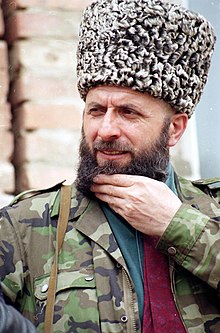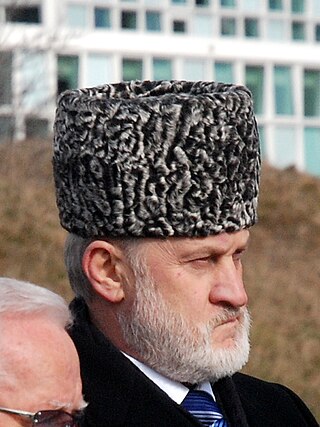
Akhmed Halidovich Zakayev is a Chechen statesman, political and military figure of the unrecognised Chechen Republic of Ichkeria (ChRI). Having previously been a Deputy Prime Minister, he now serves as Prime Minister of the ChRI government-in-exile. He was also the Foreign Minister of the Ichkerian government, appointed by Aslan Maskhadov shortly after his 1997 election, and again in 2006 by Abdul Halim Sadulayev. An active participant in the Russian-Chechen wars, Zakayev took part in the battles for Grozny and the defense of Goyskoye, along with other military operations, as well as in high-level negotiations with the Russian side.
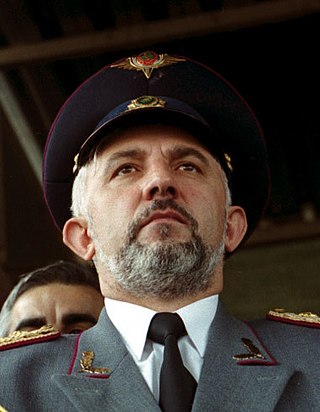
Aslan (Khalid) Aliyevich Maskhadov was a Soviet and Chechen politician and military commander who served as the third president of the unrecognized Chechen Republic of Ichkeria.

Shamil Salmanovich Basayev, also known by his kunya "Abu Idris", was a Chechen guerrilla leader who served as a senior military commander in the breakaway Chechen Republic of Ichkeria. He held the rank of brigadier general in the Armed Forces of Ichkeria, and was posthumously declared generalissimo. As a military commander in the separatist armed forces of Chechnya, one of his most notable battles was the separatist recapture of Grozny in 1996, which he personally planned and commanded together with Aslan Maskhadov. He also masterminded several of the worst terrorist attacks that occurred in Russia.

Zelimkhan Abdulmuslimovich Yandarbiyev was a Chechen writer and politician who served as second president of the Chechen Republic of Ichkeria between 1996 and 1997. In 2004, Yandarbiyev was assassinated while he was on mission to recognize Chechnya’s right for independence in Qatar.

Sergei Borisovich Ivanov is a Russian senior official and politician who has been serving as the Special Presidential Envoy on the Issues of Environmental Activities, Ecology and Transport since 12 August 2016. He has the federal state civilian service rank of 1st class Active State Councillor of the Russian Federation.
Suleiman Bekmirzayevich Yamadayev, or simply Sulim Yamadayev, was a Chechen military commander. The fourth of six Yamadayev brothers, he fought for the Chechen Republic of Ichkeria during the First Chechen War before defecting to Russia during the Second Chechen War, in which he commanded Special Battalion Vostok under Spetsnaz GRU. As such, until 2008, he was officially in command of the biggest pro-Kremlin militia beyond those controlled by Chechen president Ramzan Kadyrov, who has led Chechnya since 2007. From 1 to 22 August 2008, Yamadayev was wanted on an active federal arrest warrant in Russia, but continued to command Special Battalion Vostok uninterrupted during the Russian invasion of Georgia.
Salman Betyrovich Raduyev was a Chechen militant and separatist field commander, from 1994 to 1999, who masterminded and was responsible for the Kizlyar hostage taking raid. His activities, in his role as a commander, made him "Russia's second most wanted man."
Sultan Geliskhanov is a former head of the state security service in the Chechen Republic of Ichkeria and a former field commander in the Chechen resistance against Russia.
The Caucasian Common Market was a private holding company created to bring prosperity and well-being to the North Caucasus, and in addition, its recognition by the world community as an important subject of international commodity exchange and, consequently, international law.
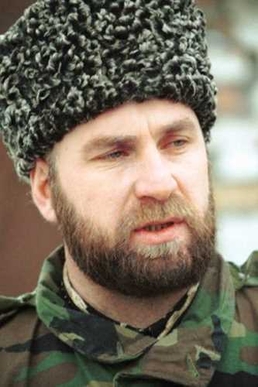
Ruslan Germanovich Gelayev was a Chechen military commander and prominent military figure of the Chechen resistance against Russia. Albeit a controversial figure, Gelayev was commonly viewed as an abrek and a well-respected, ruthless fighter. His operations spread well beyond the borders of Chechnya and even outside Russia and into Georgia. He was killed while leading a raid into the Russian Republic of Dagestan in 2004.
The 2006 abduction of Russian diplomats in Iraq took place on June 3, 2006, in Baghdad, Iraq when Iraqi insurgents ambushed a car belonging to the Russian Embassy. Vitaly Titov,, was killed in the attack and the other four people in the car – Fyodor Zaitsev, Rinat Agliuglin, Oleg Fedoseyev, and Anatoly Smirnov – were abducted.
Sergei (Sergey) Lapin, also known by his radio communications call sign Kadet ("Cadet"), is a former Russian police officer who had served in Grozny, Chechnya as a Lieutenant in the OMON from the Khanty–Mansi Autonomous Okrug. He has been convicted for the torture and "disappearance" of a Chechen student.

Arbi Alautdinovich Barayev was a Chechen warlord who in 1996 became the founder and first leader of the Special Purpose Islamic Regiment (SPIR) in Chechnya.
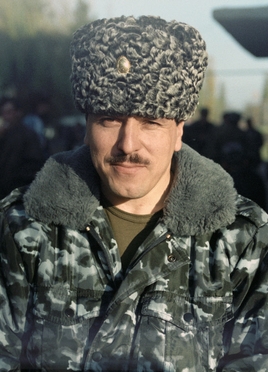
Vakha Khamidovich Arsanov was a Chechen divisional general and politician who was Vice President of Ichkeria from 1997 to 2001.

Qatar–Russia relations are the bilateral foreign relations between the two countries, Qatar and Russia.
The Russia–Chechnya Peace Treaty of 1997, also known as the Moscow Peace Treaty, was a formal peace treaty "on peace and the principles of Russian–Chechen relations" following the First Chechen War of 1994–1996. It was signed by the president of Russia Boris Yeltsin and the newly elected president of Chechnya Aslan Maskhadov on 12 May 1997, in the Moscow Kremlin.

Egorov Puginsky Afanasiev & Partners is an established international law firm in the CIS with offices in Russia, UAE, Ukraine, Belarus, and associated offices in London and Cyprus.

Zelimkhan Sultanovich Khangoshvili was an ethnic Chechen born in Georgia who was a former platoon commander for the Chechen Republic of Ichkeria as a volunteer during the Second Chechen War, and a Georgian military officer during the 2008 Russo-Georgian War. Later on, he allegedly turned into a useful source of information for the Georgian Intelligence Service by identifying Russian spies and jihadists operating on domestic and foreign soil to Georgian intelligence agents. Khangoshvili was considered a terrorist by the Government of the Russian Federation, the Federal Security Service, and wanted in Russia. On 23 August 2019, Khangoshvili was assassinated in Kleiner Tiergarten, a park in Berlin, by FSB operative Vadim Krasikov.
